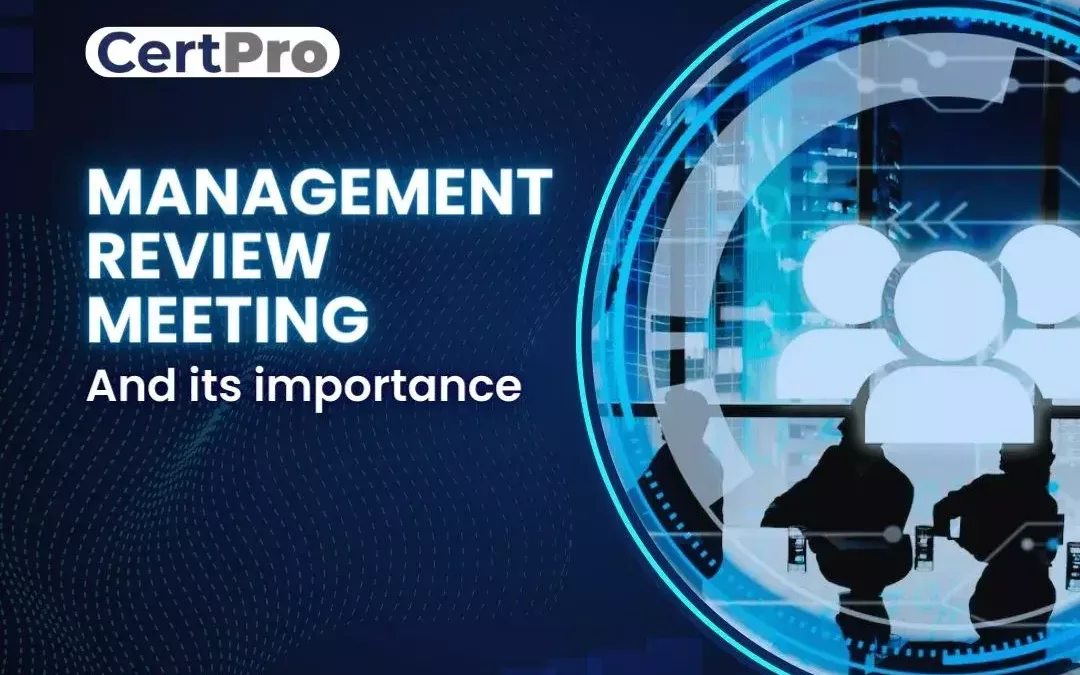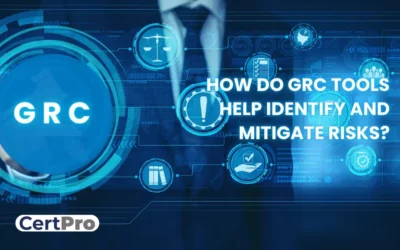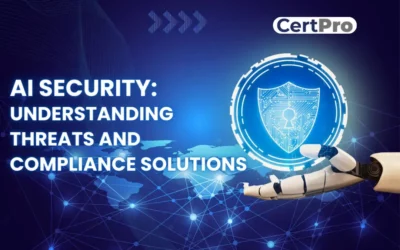This is a fast-paced and competitive business environment. For companies to stay ahead in this kind of business world, they should regularly analyze their performance and discover opportunities for growth. The management review meeting is a critical instrument for introspection and strategic decision-making.
A management review meeting is an important tool for top-level management to analyze the overall health of the business, identify areas for development, and make educated decisions to move the firm forward. These meetings provide a forum for managers to assess the organization’s overall performance and progress. Meetings are held on a regular basis, such as monthly, quarterly, or annually, depending on the needs of the company. Managers review numerous areas of the firm during these meetings, including goals, objectives, strategies, operations, and financial performance. These sessions establish alignment, accountability, and a culture of continuous improvement via collaborative conversations, data analysis, and informed decision-making.
This article discusses the significance and applications of management review and meetings, emphasizing their role in achieving organizational performance. Organizations may react to changing market dynamics, optimize resource allocation, and increase operational efficiency by reviewing performance, defining goals, and identifying areas for improvement. Now let’s dive into the article.
WHAT IS A MANAGEMENT REVIEW?
The process of examining and assessing many elements of an organization’s management practices, performance, and systems is referred to as management review. It entails examining managerial processes, strategies, operations, and outcomes in a methodical and structured manner to guarantee effectiveness, efficiency, and alignment with company goals.
Gathering pertinent data and information, doing analysis, and comparing performance to established benchmarks, industry standards, or best practices are all part of the management process. The review’s findings and recommendations for improvement may then be used to make educated decisions, implement changes, and increase organizational performance.
UNDERSTANDING MANAGEMENT REVIEW MEETINGS
A management review meeting is a formal gathering of key members of an organization’s management team to analyze and evaluate the organization’s overall performance and progress. It provides a forum for management to discuss many areas of the company, such as goals, objectives, strategies, operations, and financial performance. These meetings are often held on a regular basis, such as monthly, quarterly, or annually, depending on the needs of the company. The objective of these meetings is that managers attend them prepared with reports, data, and analysis pertaining to their particular areas of responsibility. This data gives a comprehensive picture of the organization’s performance and serves as a foundation for debate and decision-making. The meeting might include a review of key performance indicators (KPIs), an analysis of financial accounts, an evaluation of operational procedures, and an assessment of progress toward goals.
THE IMPORTANCE OF MANAGEMENT REVIEW MEETINGS
Management review sessions are critical in developing organizational cooperation, responsibility, and strategy alignment. They provide a venue for managers to examine and analyze the company’s performance in relation to established objectives, allowing them to discover areas for development and make educated decisions to propel the business ahead. The significance of these sessions may be summed up as follows:
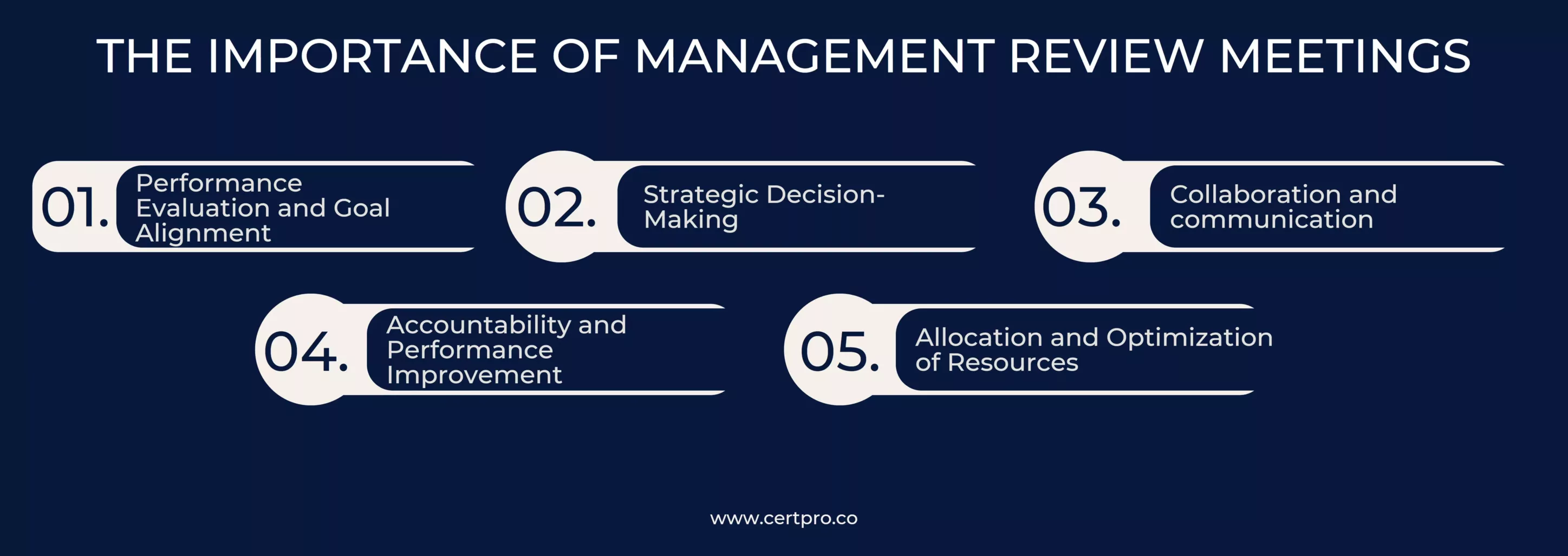
1. Performance Evaluation and Goal Alignment: Management review meetings provide for an assessment of the organization’s performance in relation to stated goals and objectives. Managers can discover areas of success and areas for development by examining key performance indicators (KPIs) and studying patterns. This assessment aids in the alignment of individual and departmental goals with general company objectives.
2. Strategic Decision-Making: These sessions assist strategic decision-making by bringing together the management team’s cumulative expertise and experience. Managers may make educated decisions about resource allocation, process improvements, and policy changes by discussing market trends, customer input, and operational difficulties. These sessions provide insights that allow the corporation to adjust and stay ahead in a dynamic business environment.
3. Collaboration and communication: Management review meetings urge managers to collaborate and communicate openly. They serve as a forum for the exchange of ideas, best practices, and lessons learned. This interchange of ideas develops an organizational culture of constant development and innovation.
4. Accountability and Performance Improvement: Managers are held accountable through regular management review sessions. Managers may hold themselves and their teams accountable for results by analyzing individual and team performance, finding gaps, and defining goals. The sessions also allow for the discussion of problems and the development of action plans for change.
5. Allocation and Optimization of Resources: Effective resource allocation is critical for organizational performance. Managers may examine and assess resource consumption across departments and projects during review meetings. Managers can improve resource allocation to achieve optimal performance and cost-effectiveness by detecting inefficiencies or imbalances.
USES OF THE MANAGEMENT REVIEW MEETING
Management review meetings serve several functions and have a variety of applications inside an organization. These gatherings are commonly used for the following purposes:
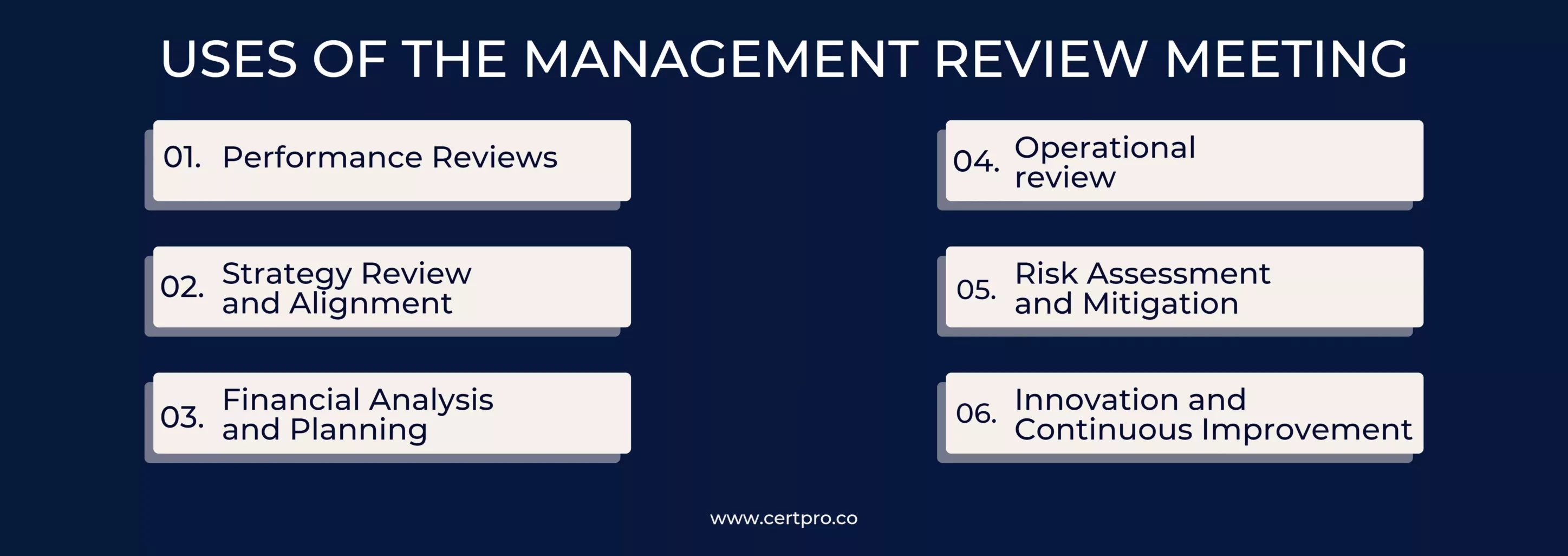
1. Performance Reviews: Management meetings give a formal platform for evaluating individual and team performance. Managers may celebrate successes, resolve performance difficulties, and give constructive criticism by analyzing KPIs. These sessions help with staff development, goal-setting, and performance improvement activities.
2. Strategy Review and Alignment: A critical element of management meetings is reviewing and revising organizational strategy. Managers may align existing strategies with changing market dynamics, consumer requirements, and future possibilities by evaluating the success of present plans. Strategic conversations at these sessions allow management to make educated decisions regarding future direction and allocate resources accordingly.
3. Financial Analysis and Planning: A critical component of management meetings is financial performance analysis. Managers evaluate revenue production, cost management, and overall financial health by reviewing financial accounts, budgets, and projections. These gatherings give insights on financial trends, risks, and opportunities, which help guide financial planning and decision-making.
4. Operational review: Management review meetings provide an in-depth examination of operational processes, revealing bottlenecks, inefficiencies, and places for development. Managers may simplify processes, increase productivity, and save costs by using process mapping, data analysis, and collaborative conversations.
5. Risk Assessment and Mitigation: Risk evaluation and mitigation are essential components of management review sessions. Managers evaluate possible risks, analyze their effects, and devise risk-mitigation methods. These talks contribute to the development of a risk-aware culture and enable proactive risk management.
6. Innovation and Continuous Improvement: Management meetings encourage managers to exchange ideas and insights in order to foster innovation and continual development. Managers may find possibilities for innovation, product creation, and process improvements by examining new trends, market disruptions, and consumer feedback.
Management review meetings are effective tools for assessing performance, aligning goals, and driving success in businesses. These meetings promote management team cooperation, strategic decision-making, and accountability. Organizations may adapt to changing market dynamics, maximize resource allocation, and develop a culture of continuous improvement by reviewing performance, defining goals, and identifying areas for improvement.
Organizations must ensure that management review sessions are well-structured, inclusive, and focused in order to fully realize their potential. For fruitful talks and practical solutions, effective facilitation, clear agendas, and thorough documentation are required. Organizations should also foster an open, transparent, and continuous learning culture, encouraging management to share insights, question assumptions, and welcome creative ways.
WHAT ARE THE OUTCOMES OF THIS MEETING?
Management review is an essential process for businesses that want to examine and improve their management practices, processes, and overall performance. Organizations get significant insights into continuous improvement and competitive advantage by methodically reviewing leadership, operations, performance management, risk management, financial management, and human resources.
Management review meetings serve as a vital mechanism for organizations to navigate change, align strategies, and drive growth. By leveraging the power of these meetings, organizations can stay ahead of the curve and achieve sustainable success.
FAQ
How frequently are management review meetings held?
The frequency of management review meetings might vary based on the demands of the firm. They can be held on a monthly, quarterly, or annual basis, depending on the organization’s complexity and the required level of evaluation and assessment.
Who usually shows up to management review meetings?
Key members of the organization’s management team attend management review sessions. This comprises top-level executives, department heads, and managers who are in charge of various aspects of the organization’s operations.
What is the role of data analysis in management review?
Data analysis is an important part of management evaluation. It entails reviewing pertinent data and performance measures in order to evaluate the organization’s performance in relation to objectives and benchmarks. Data analysis identifies trends, patterns, and opportunities for improvement, laying the groundwork for sound decision-making and improvement plans.
What are the essential aspects in the management review process?
Management evaluations must be documented at all times. The review’s observations, findings, and suggestions for next action must be documented. If corrective or preventive action is required, the management team should follow up to ensure that the activity was carried out successfully.
What exactly is management review control?
Management review controls are management’s judgements of the appropriateness of estimates and other sorts of information. They need a high level of judgment, knowledge, and experience.

About the Author
RAGHURAM S
Raghuram S, Regional Manager in the United Kingdom, is a technical consulting expert with a focus on compliance and auditing. His profound understanding of technical landscapes contributes to innovative solutions that meet international standards.
HOW DO GRC TOOLS HELP IDENTIFY AND MITIGATE RISKS?
In today’s fast-paced business environment, emerging threats and risks negatively influence business operations. Threats can arise from different sources, such as cybersecurity compliance requirements, supply chain disruption, and natural disasters. Thus, the...
AI SECURITY: UNDERSTANDING THREATS AND COMPLIANCE SOLUTIONS
Artificial Intelligence continues to grow and become more relevant in workplaces. Customers widely use it to handle market products. Organizations are desperately using AI for their businesses, ensuring that the AI systems comply with the new rules and regulations. In...
HOW DOES THE NIST CYBERSECURITY FRAMEWORK FUNCTION, AND WHY IS IT IMPORTANT?
Emerging cyber threats make cybersecurity an essential consideration for organizations handling and managing data. In this regard, the NIST cybersecurity framework applies to improving your cybersecurity program. It is a set of guidelines that helps improve your...

